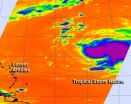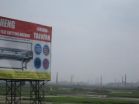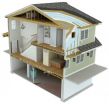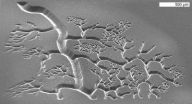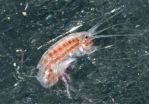(Press-News.org) A new study finds that smart growth approaches to urban planning could substantially reduce the number of miles that residents drive in a year. The research was published this week in The B.E. Journal of Economic Analysis and Policy.
Smart growth focuses on the development of compact, walkable cities with houses and jobs located close together. By shortening residents' commutes, this form of urban design aims to cut transportation-related energy use and greenhouse gas emissions. California is already pursuing smart growth in order to meet emissions reductions set by the state's Global Warming Solutions Act (AB 32).
In a behavioral economics study, researchers at San Francisco State University found that a 10 percent increase in a city's smart growth features -- including housing density, jobs per capita and public transit infrastructure -- would lead to a 20 percent decrease in the number of vehicle miles traveled per household, per year.
"We found that changing the way cities are designed would significantly reduce travel demand," said Sudip Chattopadhyay, professor and chair of economics at SF State. "People's travel habits would change, and they would drive less."
These latest results stand in contrast to previous studies that have suggested that smart growth only has a small impact on transport demand. Chattopadhyay says that in the past economists have struggled to find the right methodologies to understand how people's behavior changes in response to urban planning.
For the present study, Chattopadhyay developed an innovative way to predict people's behavior, particularly how people make decisions about where to live. The study focused on 18 urban areas across the United States and used census data and information from the 2001 National Household Travel Survey and the National Transit Database.
The study found that smart growth strategies yield greater reductions in car use compared to the use of fuel tax increases. It suggests that a 10 percent increase in the dollar cost of driving one mile would result in an 18 percent decrease in annual vehicle miles traveled per household, compared to a 20 percent decrease from smart growth strategies.
"It's only a few percent points but it is a significant difference," Chattopadhyay said. "Smart growth is a more gradual, long-lasting change and it generates employment. Tax increases can be implemented more quickly but they are subject to change depending on the political situation."
Chattopadhyay notes that there are other benefits of smart growth not measured in his study. Neighborhood design that encourages walking,
for example, may improve residents' health, and the development of compact cities might prevent urban sprawl and help preserve open space.
###
"Do Smart Growth Strategies Have a Role in Curbing Vehicle Miles Traveled? A Further Assessment Using Household Level Survey Data" was authored by Sudip Chattopadhyay and Emily Taylor, who graduated from SF State with a master's in economics in 2010. It was published online on Sept. 11, 2012 in The B.E. Journal of Economic Analysis and Policy.
The paper is available online at: http://www.degruyter.com/view/j/bejeap.2012.12.issue-1/1935-1682.3224/1935-1682.3224.xml
'Smart growth' strategies curb car use, greenhouse gas emissions, SF State study suggests
2012-09-14
ELSE PRESS RELEASES FROM THIS DATE:
NASA sees wind shear battering Tropical Storm Nadine
2012-09-14
Tropical Storm Nadine is struggling against wind shear and some dry air. Infrared satellite imagery from NASA showed that Nadine's most powerful thunderstorms were being pushed east of the center.
NASA's Aqua satellite passed over Tropical Storm Nadine early on Sept. 13 and saw several factors that indicated the storm was still struggling to achieve hurricane status.
Infrared data from the Atmospheric Infrared Sounder (AIRS) that flies aboard Aqua found the strongest thunderstorms with very cold cloud temperatures (colder than -63F/-52C) were being pushed east of Nadine's ...
Warmer temperatures make new USDA plant zone map obsolete
2012-09-14
Gardeners and landscapers may want to rethink their fall tree plantings. Warming temperatures have already made the U.S. Department of Agriculture's new cold-weather planting guidelines obsolete, according to Dr. Nir Krakauer, assistant professor of civil engineering in The City College of New York's Grove School of Engineering.
Professor Krakauer developed a new method to map cold-weather zones in the United States that takes rapidly rising temperatures into account. Analyzing recent weather data, he overhauled the Department of Agriculture's latest plant zone map released ...
Researchers develop rapid method to measure carbon footprints
2012-09-14
Researchers have developed new software that can rapidly calculate the carbon footprints of thousands of products simultaneously, a process that up to now has been time consuming and expensive. The methodology should help companies to accurately label products, and to design ways to reduce their environmental impacts, said Christoph Meinrenken, the project's leader and associate research scientist at Columbia University's Earth Institute and Columbia Engineering. A new study, published online in the Journal of Industrial Ecology, describes the methodology.
The project ...
Home sweet lab: Computerized house to generate as much energy as it uses
2012-09-14
In a ribbon-cutting ceremony on Sept. 12, 2012, the U.S. Commerce Department's National Institute of Standards and Technology (NIST) unveiled a new laboratory designed to demonstrate that a typical-looking suburban home for a family of four can generate as much energy as it uses in a year. Following an initial year-long experiment, the facility will be used to improve test methods for energy-efficient technologies and develop cost-effective design standards for energy-efficient homes that could reduce overall energy consumption and harmful pollution, and save families money ...
Nanoengineers can print 3D microstructures in mere seconds
2012-09-14
Nanoengineers at the University of California, San Diego have developed a novel technology that can fabricate, in mere seconds, microscale three dimensional (3D) structures out of soft, biocompatible hydrogels. Near term, the technology could lead to better systems for growing and studying cells, including stem cells, in the laboratory. Long-term, the goal is to be able to print biological tissues for regenerative medicine. For example, in the future, doctors may repair the damage caused by heart attack by replacing it with tissue that rolled off of a printer.
Reported ...
Childrem of immigrants come out ahead of peers
2012-09-14
Children of immigrants are outperforming children whose family trees have deeper roots in the United States, learning more in school and then making smoother transitions into adulthood, according to sociologists at The Johns Hopkins University.
Researchers Lingxin Hao and Han S. Woo tracked nearly 11,000 children from as young as age 13 into their early 30s, coming from families with diverse backgrounds. When comparing children with similar socioeconomic status and school conditions, Hao and Woo found that the best students, and later the most successful young adults, ...
Surviving without ice
2012-09-14
With sea ice in the Arctic melting to record lows in summer months, marine animals living there face dramatic changes to their environment. Yet some crustaceans, previously thought to spend their entire lives on the underside of sea ice, were recently discovered to migrate deep underwater and follow ocean currents back to colder areas when ice disappears.
"Our findings provide a basic new understanding of the adaptations and biology of the ice-associated organisms within the Arctic Ocean," said Mark Moline, director of the University of Delaware's School of Marine Science ...
Should I marry him?
2012-09-14
Doubt is not a pleasant mental state, but certainty is a ridiculous one.
—Voltaire
In the first scientific study to test whether doubts about getting married are more likely to lead to an unhappy marriage and divorce, UCLA psychologists report that when women have doubts before their wedding, their misgivings are often a warning sign of trouble if they go ahead with the marriage.
The UCLA study demonstrates that pre-wedding uncertainty, especially among women, predicts higher divorce rates and less marital satisfaction years later.
"People think everybody has ...
Obesity more common among rural residents than urban counterparts, study finds
2012-09-14
KANSAS CITY, Kan.—A new study finds that Americans living in rural areas are more likely to be obese than city dwellers. Published in the National Rural Health Association's Fall 2012 Journal of Rural Health, the study indicates that residential location may play an important role in the obesity epidemic.
Led by researchers at the University of Kansas, the study analyzed data collected by the National Center for Health Statistics and is the first in more than three decades to use measured heights and weights. Previous studies have relied on self-reported data, which typically ...
Cystic fibrosis patients of low SES are less likely to be accepted for lung transplant
2012-09-14
Adult cystic fibrosis (CF) patients of low socioeconomic status (SES) have a greater chance of not being accepted for lung transplant after undergoing initial evaluation, according to a new study.
"While earlier studies have indicated that SES does not affect access to care for cystic fibrosis, ours is the first study to examine the relationship between SES and access to lung transplantation in these patients," said lead author Bradley S. Quon, MD, MSc, MBA, of the University of Washington Medical Center in Seattle. "In our nationally representative sample of adult patients ...
